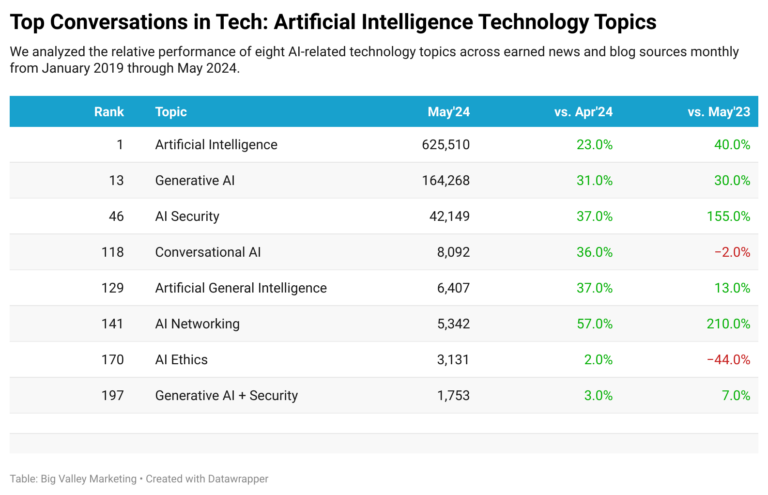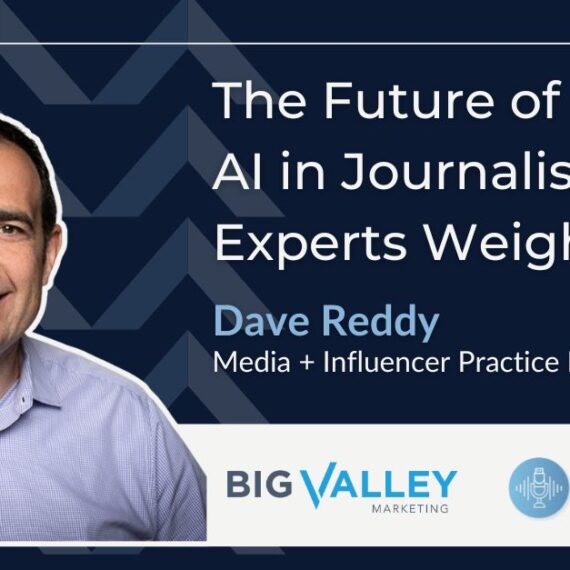Earlier this month, we took a broad look at the Top Conversations in Tech for May 2024, where we analyze hot and declining trends to help technology marketers maximize their relevance. Join us now for a deep dive on Artificial Intelligence, a topic that has been at the top of our charts for 12 of the past 13 months.

Interest in Artificial Intelligence has grown substantially, thanks in part to the emergence of Generative AI in fall 2022 – though the two topics are not synonymous and may follow different paths moving forward. AI conversation volume grew from 114,000 average monthly citations in 2019 to 510,000 citations in 2024. Generative AI started from virtually nothing – just 27 monthly citations in 2019 to 127,000 in 2024. As seen in the above chart, AI conversation volume still outpaces Generative AI by roughly 4X.
Should we expect continued increase in Generative AI conversation? Most likely, but massive hype usually leads to a trough of disillusionment – and other AI subtopics are gaining traction as well. For example, AI Security increased similarly month-over-month and year-over-year. The continued integration of AI into other technologies, along with upcoming election security concerns and the increase of cyberattacks, provides a reason for tech organizations to further push AI into the security space.

Our Take: AI progress and integration have been strong focal points for media, analysts, vendors and customers. AI Security may be the next rising star within the AI market.
AI risk factors are high for some companies as they decide how to navigate this ever-changing space. For example, Google struggled in May with negative product blowback due to funky Gemini AI responses (maybe don’t put glue on your pizza). What’s noteworthy about the Google incident was how media covered and analyzed the issue: (1) describing the incident; (2) detailing the incident timeline; and (3) analyzing the brand’s response.
Our Take: The Gemini coverage cycle reinforces what matters to media—information and updates on what happened, followed by diagnosis of what actions brands took to rectify the issue(s). All a good reminder that companies need to have prepared messaging for a range of contingencies if they want to lead the conversation and not merely contribute.
AI progress and adoption inevitably lead to legal questions and regulations. Both the European Union and the International Organization for Standardization highlighted new AI guidelines and regulations in May to address ethical considerations: transparency, risk management, minimal data bias, data privacy, etc.. More locally, states discussed and proposed various new AI regulations. Colorado most recently signed the Consumer Protections for Interactions with Artificial Intelligence into law with an effective date of February 1, 2026. The question remains: Are companies prepared for it?
However, not all government officials fully support AI regulations. Some, like California Governor Gavin Newson, voiced reservations about regulation stifling innovation, expressing concerns about how strict California AI regulations could impact California’s position as the technology kingpin for the U.S.
Our Take: Continued regulation conversations should be viewed as a when not an if. Companies need to prepare stances and statements on how they are adapting to proposed – and signed – AI laws that should take effect in the coming years.
What else stood out? Various media outlets focused on educating consumers on different AI models, while both brands and public sector officials explained how AI products can aid a social need, like integrating AI into healthcare or using AI to address homelessness. These adoptions were not without hesitations: questions of safety, ethics, biases, and transparency were core to each conversation.
Bottom Line: The AI conversation has become even more multifaceted with a growing interest in regulation, social impact and adoption use cases. As we move into the second half of 2024, we will keep an eye out for how much the presidential election impacts the AI debate. We suspect it will, whether via the candidates themselves or news commentary about the wave of deepfakes and misinformation on the horizon.
Want in-depth insights on cybersecurity? Stay tuned for another deep-dive analysis later this month, available via Big Valley’s LinkedIn channel and website.











